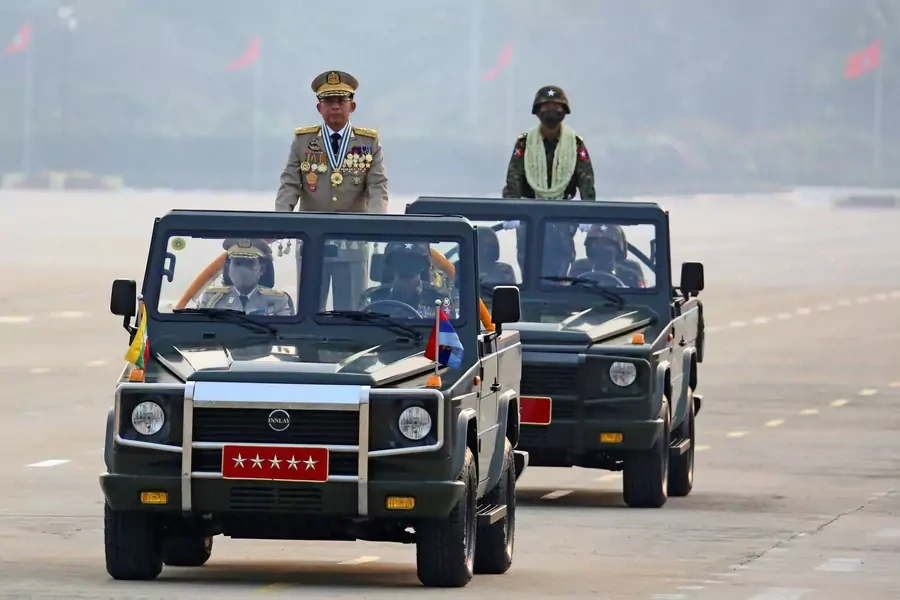Joshua Kurlantzick
.

This will be a short blog post, and I’ll expand further on the deteriorating situation for the Myanmar military in a second post at greater length.
The Myanmar military, which has been in control of the country since last year’s coup and has wreaked havoc on the economy, the population, and public health – creating essentially a failed state – started the post-coup period with a massive advantage over the forces arrayed against it. Ethnic armed organizations, excluding the United Wa State Army in the northeast which stayed out of the battle, did not possess the manpower and arms to take the military head-on. Meanwhile, though many Myanmar activists fled into the jungles and began to train as resistance forces after months of nonviolent protest led to nothing but brutal and bloody crackdowns and arrests, they were still green, lacking a lot of modern weaponry and relatively untrained in military tactics.
But in recent months, the tide has begun to turn significantly. There is now a real possibility that the Myanmar armed forces could lose militarily to the loose combination of ethnic armed organizations and the rebel groups, the People’s Defense Force militias scattered across the country and picking up growing numbers of recruits who are sensing the military’s weaknesses.
For one, the military probably believed it could subdue the armed ethnic organizations and the People’s Defense Force in 2021, before the PDF trained, got more modern weaponry, and began to come together as a fighting force. But the Myanmar military did not, instead deploying archaic tactics of bombing villages, massacring civilians, and burning towns altogether all over the country. The military has continued with these brutal and unnuanced tactics of just launching artillery and airstrikes at towns and places where it believes rebels are located, but this hammer approach is not stopping the rebel groups. It has failed to overwhelm the PDF forces when it can, giving them further hope.
In addition, this hammer-like, brutal strategy not only led to more people joining the PDF in anger, but also alienated even some Myanmar soldiers – who were also increasingly being pressured by Myanmar activists online via social media campaigns and other strategies to leave the brutal military. This campaign seems to be working, as the Myanmar armed forces are having trouble holding onto recruits, are not filling classes at their defense academy, and are suffering significant defections from their forces in the field. All this weakens the military and places them in an even more vulnerable position. The military is also suffering from aging and deteriorating weaponry, though the army may be getting some new arms from Pakistan and possibly from Russia, though Russia’s arms are obviously depleted now, another problem for the Myanmar junta. As Michael Martin of CSIS notes, the army, lacking men, is forcing police units to fill some military positions, though with little success.
At the same time as the army continues its blunt and ineffective tactics and loses soldiers, the rebels are getting better trained and equipped, and developing better command and control networks. The rebels are showing they are capable of fighting longer battles with the army and winning some of them. As noted in Asia Times, the military has lost two bases to the rebels and the armed ethnic organizations. Not to mention, of course, that the rebels and ethnic armed organizations generally enjoy the support of local populations, which makes it easier for them to hide from the military, find supplies from local villagers, and generally get a boost in morale.
Indeed, the PDFs are gaining ground against the military in various places around the country. It is not out of the question now that the military could lose, or even at some point begin to collapse from within, especially if more and more senior officers begin to see the growing numbers of defections and if the PDF and ethnic armed organizations win several larger scale victories. The opposition forces already are in control of a large portion of the country. As the dry season, normally the military’s best chance to dominate the opposition, fades into the rainy season in several months, the advantage will swing even further to resistance forces – who, if they win, may finally gain accountability for all the abuses committed by the military, which has enjoyed a culture of impunity for decades.
No comments:
Post a Comment